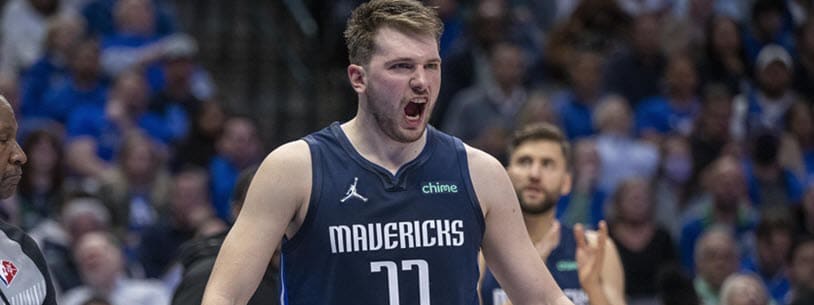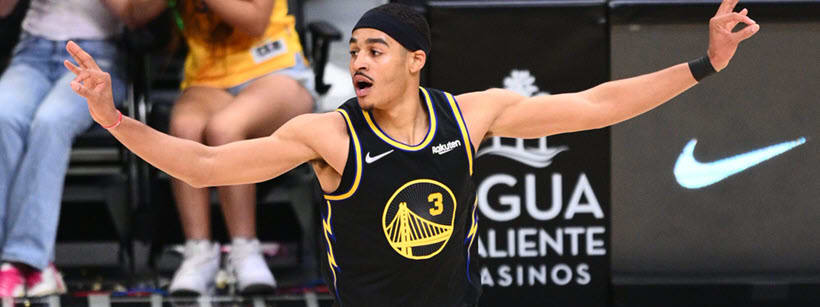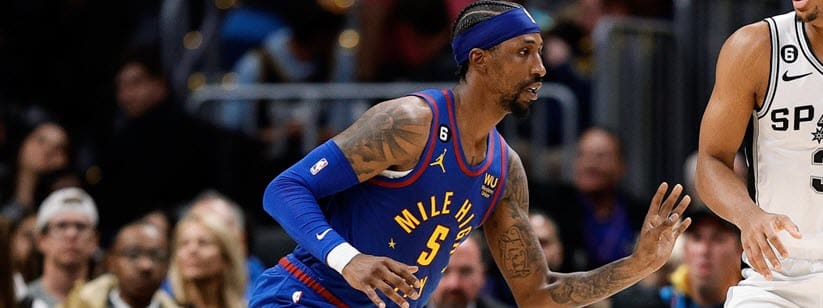Recent RotoWire Articles Featuring Otto Porter
See More
Injuries continue to be the story when it comes to summing up Porter's career. After a relatively healthy season in 2021-22, Porter managed just eight games last year as a result of a foot injury. In those eight games, he played 18.3 minutes per night for the Raptors, averaging 5.5 points to go with 2.4 rebounds and 1.4 steals. He will return to Toronto for the 2023-24 season, sliding into a backup role behind OG Anunoby, Pascal Siakam, Jalen McDaniels and Chris Boucher. He still possesses the ability to cobble together a well-rounded performance, although lack of playing time could result in him being a non-factor, even in slightly deeper formats. Should he somehow carve out a 24-minute role, there is a chance he at least puts himself on the radar, especially in roto leagues.
Porter spent most of the 2021-22 season appearing off the bench for the Warriors, averaging 22.2 minutes per game en route to 8.2 points, 5.7 rebounds and 1.5 assists per contest. He remained strong on defense, finishing with his second-best steals per 36 mark (1.01) of his career. Having moved north of the border this offseason, Porter seems most likely destined for a bench role for the Raptors, though he could be in line for more minutes. Porter was a valuable option as a scoring threat from beyond the arc for Golden State last year, knocking down 37.0 percent of his attempts from deep, where he connects on north of 40 percent for his career. That trait should earn him sizable minutes on a Toronto squad that ranked 23rd in the NBA (34.5 percent) from three last season, especially when compared to a Warriors team that sported to star scoring threats from deep in Stephen Curry and Klay Thompson. Porter doesn't stand out in any particular area from a fantasy perspective, but his well-rounded profile should grant him utility in some league formats.
After playing just 42 games in two seasons, Porter agreed to a veteran minimum deal with the Golden State Warriors during free agency. The 2013 No. 3 overall pick has regressed in every season since leaving the Wizards, finishing last year averaging under 10.0 points per game for the first time since the 2014-15 campaign. It's unclear what role awaits Porter in Golden State, as the Warriors also acquired Andre Iguodala, Nemanja Bjelica, Jonathan Kuminga and Moses Moody this offseason. Porter finished inside the top 30 of overall fantasy scorers in back-to-back seasons playing as the third option behind John Wall and Bradley Beal. If he is able to stay healthy, he may be able to rekindle that success as a wingman to Stephen Curry and Klay Thompson. However, the most likely scenario is that Porter operates as a veteran presence until Thompson returns or one of the rookies -- Kuminga and Moody -- bursts onto the scene. Andrew Wiggins was able to revitalize his career by becoming a more efficient player with Golden State, shooting 47.7 percent from the field and 38.0 percent from three -- both career-highs. If Porter is able to follow in Wiggins' footsteps he may have a chance to be a consistent fantasy producer once again.
It was a lost season for Porter in his first full year with the Bulls. Due to a left foot injury that lingered throughout the season, he appeared in a career-low 14 contests. Even while on the court, Porter's production declined. His numbers pre- and post-injury weren't too different, and the returns were disappointing. His 11.9 points per game were his fewest since 2015-16, his 3.4 rebounds were his fewest since his sophomore season in 2014-15, and his 1.8 assists were his lowest since 2016-17. Furthermore, his 1.1 steals and 1.7 threes were well off his usual production. OPJ shot 44.3 percent from the floor and 70.4 percent from the charity stripe -- both his lowest marks since his rookie campaign. In all likelihood, Porter's down year was the result of his lingering injury, and if he can stay on the court in 2020-21, he has a chance to bounce back. In his final full season with Washington in 2017-18, Porter provided 14.7 points, 6.4 boards and 2.0 assists, and if he can reprise his Wizards form, Porter could be a top-100 play.
Despite struggling (by his standards) through 41 games with the Wizards in 2018-19, Porter played arguably the best basketball of his career across 15 appearances for the Bulls after being acquired prior to the trade deadline. Although his season was cut short by knee and shoulder injuries that kept him sidelined for the final 11 contests, Porter proved to be a strong fit on both ends of the court for Chicago, pouring in career-high averages in points (17.5), assists (2.7), made threes (2.6) and minutes (32.8) while connecting on career-best shooting percentages from beyond the arc (48.8) and the charity stripe (90.6). The sample size is obviously small, and this was the first time since his rookie year that he appeared in less than 74 games. However, the Bulls empowered Porter, allowing him to showcase a more impressive and well-rounded offensive skillset than he ever had a chance to display during his five-and-a-half-year tenure with the Wizards. Moreover, Chicago's key offseason additions (Tomas Satoransky and Thaddeus Young) are both low-usage offensive players with unselfish tendencies, so Porter can be expected to maintain plenty of responsibility as a scorer going forward. As a result, there's a decent chance the 26-year-old wing builds off the positive momentum and turns in his best statistical campaign in 2019-20.
After signing a four-year, $106 million contract extension last offseason, Porter took to the floor for his fifth campaign, essentially duplicating his numbers from the year before. He finished with 14.7 points, 6.4 rebounds, 2.0 assists, 1.5 steals and 1.8 three-pointers across 31.6 minutes. Most notably, he proved that his breakout shooting during the 2016-17 season wasn't a fluke, as Porter shot 50.3 percent from the floor and a career-high 44.1 percent from deep. That placed him third in the NBA for three-point percentage, behind only Darren Collison and Reggie Bullock. Despite the solid output, Porter's numbers were actually fairly disappointing considering he had a big opportunity to step up with John Wall missing 41 games due to a knee injury. Instead, he simply stuck to his usual role and let Bradley Beal do the bulk of the playmaking. With Wall healthy heading into the 2018-19 campaign, the Wizards should be back to full strength, and they also return the majority of their regular contributors. Porter should once again slot in as the third option behind both Wall and Beal offensively, while chipping in across the box score with some solid multi-category production. When you add in his stellar shooting percentages and lack of turnovers (just 1.0 per game in 2017-18), Porter should slot into that second tier of small forwards behind the superstars like LeBron James, Kawhi Leonard, Kevin Durant and Paul George.
Porter, at 23-years-old last season, burst onto the scene by establishing himself as one of the league’s premier three-point threats. Out of all qualified candidates, Porter ranked fourth in three-point percentage (43.4) en route to 13.4 points per game. That percentage was behind only Joe Ingles (44.1), Allen Crabbe (44.4) and Kyle Korver (45.1). He’s also one of the NBA’s better wing defenders (1.5 steals) and commits just 0.6 turnovers while snagging a solid 6.4 rebounds per game. Over the summer, the Wizards rewarded Porter’s impressive play by matching the four-year, $106 million offer sheet by the Nets. While he will likely still remain either the third, or fourth, option within the Wizards offense (competing with John Wall, Bradley Beal and Markieff Morris), his overall skill as a player makes him tough to resist in Fantasy. Despite his place in the pecking order, Porter still has big-game upside. Notably, on Nov. 9 against the Celtics, he posted 34 points (14-19 FG, 3-5 3Pt, 3-3 FT), 14 rebounds, four assists, three steals and three blocks across 38 minutes while committing no turnovers. While he’s relatively low-volume, Porter certainly warrants an early-round selection in most formats.
Porter held down a full-time role on the Wizards’ top unit for the first time in his three seasons in the league in 2015-16, starting 73 of 75 games at either forward spot. With the move to the starting five came enhanced minutes, but Porter didn’t exactly break out in the way some had expected coming out of training camp. The 6-foot-8 forward averaged 11.6 points, 5.2 rebounds, 1.6 assists, 1.4 steals and 1.3 three-pointers in 30.3 minutes per game while shooting 47.3 percent from the field and 75.4 percent from the charity stripe, numbers that made him a low-end asset in shallower fantasy formats. Though he has an intriguing pedigree as a former No. 3 overall pick, it’s clear that, in terms of usage on the offensive end, Porter is still no better than fourth in the Wizards’ pecking order behind John Wall, Bradley Beal and Marcin Gortat. As such, it’s tough to count on the 23-year-old to notice a dramatic spike in his production in Year 4 unless one of those aforementioned players succumbs to a long-term injury that would conceivably open up more shot attempts and minutes for Porter. There’s still value to be had from Porter in certain fantasy formats and in real life as a developing 3-and-D wing who is also comfortable in the lower block, but so long as he remains a complementary piece in the Wizards’ attack, Porter’s ceiling remains a bit limited.
For the first two seasons of his career, the Wizards have treated Porter with kid gloves. He has played behind veterans Trevor Ariza and Paul Pierce. While Washington added Jared Dudley in the offseason, 2015-16 may be the season for the former Georgetown Hoya to come into his own. The third pick of the 2013 draft showed some signs in the playoffs with 10.0 points and 8.0 rebounds over the 10-game stretch. Overall, his second season was a modest improvement over his very quiet rookie year. Porter provided 6.0 points, 0.5 three-pointers, 3.0 rebounds, 0.9 assists, 0.6 assists, and 0.4 blocks. The small forward hit 45 percent of his field goals and 73 percent of his freebies. He appeared in 74 games with 13 starts and averaged 19 minutes. Porter has a diverse game that shows range beyond the arc, and he could be a quality defender with principles he learned under John Thompson III. Porter also showed a nice development curve in his two years as a Hoya, so he could be in for a breakout season, particularly if he can crack the starting lineup.
The third-overall pick in the 2013 NBA Draft, Otto Porter Jr. had minimal impact during his rookie season. He was thought to be one of the draft's more NBA-ready prospects and was considered by many to be a relatively safe pick. However, after losing the first month of his rookie season to a hip injury, Porter never emerged as a consistent part of the Wizards' rotation, as he was stuck behind both Trevor Ariza and Martell Webster at small forward. Porter ultimately played in just 37 games, averaging 2.1 points, 1.5 rebounds, 0.3 assists. 0.2 steals, and 0.0 blocks in nine minutes per game. Following his poor rookie season, Porter did provide cause for optimism this summer, averaging 19.0 points, 5.8 rebounds, 1.8 assists, 0.5 steals, and 0.3 blocks in six games at the Las Vegas Summer League. Just as encouraging as his strong counting stats, Porter shot 48 percent from the field and 39 percent from three-point range, albeit while making just 68 percent of his free throws. The Wizards still have a crowd at small forward with Paul Pierce and Martell Webster, but the team will likely find a way to work Porter in if he shows that he's much improved from last season. Porter may have an excellent opportunity to prove his worth early on, as Webster could miss the beginning of the year after undergoing back surgery in the offseason.
Everyone knew the Wizards were going to take the Georgetown star with the third pick this summer, but his fantasy impact is much more up in the air. Porter is lauded for moving well without the ball, passing well, and playing solid defense. With his backcourt mates taking most of the shot attempts, Porter should be a great long-term fit for the Wizards, but, he'll probably receive sixth-man type minutes early on. He'll need a season of experience to hone his three-point shooting.













